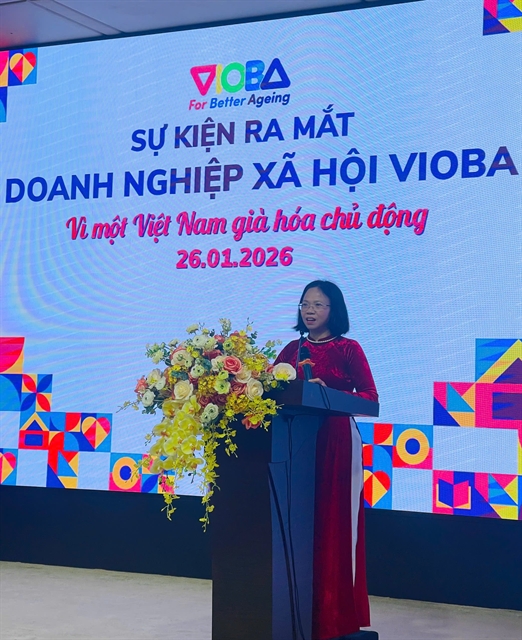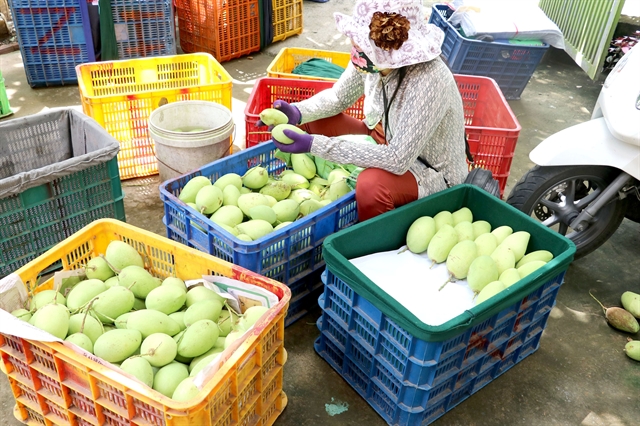 Society
Society

The Cửu Long (Mekong) Delta province of Đồng Tháp is cultivating mangoes under good agricultural practices (GAP) standards and developing linkages among stakeholders to secure outlets and improve fruit value.

|
| Harvested cát chu mangoes in Đồng Tháp Province’s Cao Lãnh City. — VNA/VNS Photo Nguyễn Văn Trí |
ĐỒNG THÁP — The Cửu Long (Mekong) Delta province of Đồng Tháp is cultivating mangoes under good agricultural practices (GAP) standards and developing linkages among stakeholders to secure outlets and improve fruit value.
The province, which is the largest mango producer in the delta, has applied advanced farming techniques and made products from fresh mangoes for domestic consumption and export.
The province has more than 9,000ha of mango, mostly in Cao Lãnh District and Cao Lãnh City. Of its total mango growing area, the Hòa Lộc variety accounts for 70 per cent and Cát Chu variety 20 per cent. The two varieties are speciality mangoes in high demand by consumers.
Nguyễn Phước Thiện, director of the province’s Department of Agriculture and Rural Development, said the province ensured a stable supply of quality mango sources for processing mango products for export.
The province has 4,533ha of mango granted production unit codes for export to China and 376ha granted production unit codes for export to the US, Canada and Russia.
Code-granted mango growing areas have a minimum area of 10ha each, grow only mango variety, and grow the fruit under Vietnamese good agricultural practices (VietGAP) standards or other equivalent standards.
These areas also meet many other requirements such as pesticide use regulations and maintenance of a cultivation diary for traceability purposes.
The province is reviewing its zoning to develop concentrated mango growing areas to meet export requirements.
It has established two large-scale specialised mango growing areas in Cao Lãnh District and Cao Lãnh City.
The Cao Lãnh mango in Cao Lãnh City and Cao Lãnh District has been granted geographical indication certification.
The cultivation of mango in the districts Thanh Bình, Lấp Vò and Châu Thành is being expanded.
Around 342ha of mango are planted to VietGAP and GlobalGAP standards and 5.7ha mango under organic standards in the province.
Nguyễn Thành Tài, deputy director of the province’s Department of Science and Technology, said the quality and value of mango has been enhanced by using VietGAP and GlobalGAP standards, producing off-season mango, and developing code-granted mango growing areas in recent years.
To have high-quality mango for exports, on-tree mangoes have to be covered by bags to improve their appearance and be harvested at the proper ripening time, he said.
The province produces more than 100,000 tonnes of mango a year, most of which are consumed domestically. It exports hundreds of tonnes of mangoes a year.
Off-season mangoes are cultivated on more than 6,600ha.
Off-season mangoes sell for VNĐ8,000-30,000 (35 cent-US$1.3) a kilogramme more than mangoes harvested in the main harvest season.
Farmers who grow off-season Hòa Lộc mangoes can earn an average profit of VNĐ180 million ($7,780) per hectare a year, according to farmers.
The province has developed co-operatives for farmers to grow mangoes and linkages among stakeholders for sustainable production.
Thiện, director of the province’s Department of Agriculture and Rural Development, said the province has developed eight co-operatives, 37 co-operative groups and 23 farmer clubhouses for growing mangoes on a total area of 1,073ha.
The co-operatives, co-operative groups and farmer clubhouses have signed farm contracts with more than 10 companies that buy fresh mangoes for export and manufacturing mango products.
Some of the companies have processed fresh mangoes into products like dried mango, frozen mango and mango wine. — VNS





 Brandinfo
Brandinfo